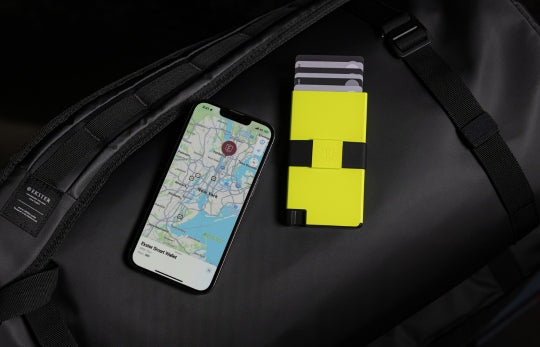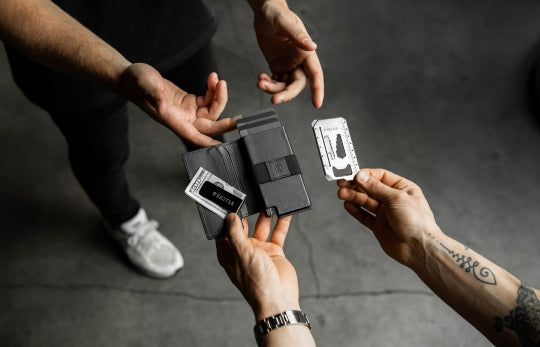Ekster is proud to work with Climate Neutral to offset our carbon footprint for our Production in 2020. Find out exactly what we've done to reduce our footprint.
What does it mean to be climate neutral?
To be climate neutral, pure and simple, is to have net zero emissions. This can be accomplished by removing the same amount of carbon from the atmosphere as you emit, or by getting rid of greenhouse gas emissions all together. Either way the goal is the same - reduce and eventually harmful emissions that contribute to climate change.
 [Find out everything about our Vegan Leather Wallets.]
[Find out everything about our Vegan Leather Wallets.]
empty heading
Why is being climate neutral important - what’s the impact?
We’ve all heard of climate change and seen its devastating effects across the globe. But the actual science of it is a bit more complicated. One of the main causes of climate change is the release of greenhouse gases, like carbon, into the atmosphere. These gases trap heat in the atmosphere, slowly but surely causing global temperatures to rise.
 [Here's everything you need to know about how our road to sustainability started.]
[Here's everything you need to know about how our road to sustainability started.]
What is a Climate Neutral Certification and why does it matter?
Being climate neutral means that we remove as much greenhouse gas from the atmosphere as we produce. We do this through something called carbon offsetting.
Carbon offsetting is a way to drive investment into climate change solutions like planting new trees and creating the infrastructure for renewable energy projects. We are able to invest in these projects through carbon credits.
Carbon credits are a way to make sure we are removing as much greenhouse gas as we emit. One carbon credit is equal to avoiding or removing one metric tonne of carbon dioxide equivalent (a fancy way to say greenhouse gases) from the atmosphere. We use carbon credits to invest directly into the projects that remove these emissions.
[Pictured above: ECCO's factories where the sustainable leather for our leather goods is made]
We offset our entire 2020 footprint by purchasing carbon credits to fund climate change solutions. We support five projects that help clean up the environment and benefit local and global populations. Each project is verified, ensuring they’re effectively protecting our climate.
The Southern Cardamom Project develops sustainable agriculture and ecotourism economies to reduce dependence on deforestation in the Cardamom forest. The Cardamom forest is a biodiversity hotspot that stretches over Cambodia, Thailand and Vietnam, and is home to over 50 threatened species including clouded leopards and Asian elephants.
Recognizing that clearing land is a primary source of income for local communities, the project focuses on economic development to alleviate pressure on this diverse ecosystem. The project supports additional community development by expanding healthcare options, creating local scholarship funds for students, and providing community training programs specifically for women.
 [Pictured above: children walking with an endangered species of elephant, similar to the threatened population of the Black Rhino.]
[Pictured above: children walking with an endangered species of elephant, similar to the threatened population of the Black Rhino.]
Many households in Mali use wood-burning stoves, which contribute to local deforestation. Inefficient wood-burning stoves can also cause poor indoor air quality for households. The Bamako Clean Cookstoves project strives to replace inefficient wood-burning stoves with more efficient Sewa stoves. These stoves can reduce wood and charcoal burning by 30-40% and improve indoor air quality by reducing emissions.
The stoves are made locally, contributing to the community's economy. Additionally, the efficient stoves help make cooking faster and safer, which helps free up time for primarily women in the community. Finally, the stoves also create benefits for local ecosystems by reducing deforestation and emissions associated with charcoal production.
 [Did you know most fast-fashion brands use factories that create huge amounts of pollution?]
[Did you know most fast-fashion brands use factories that create huge amounts of pollution?]
Geothermal energy is a great renewable energy replacement for the burning of fossil fuels that harnesses heat from the earth. While Indonesia is home to over 150 active volcanoes, and about 40% of the world's geothermal energy reserves, most of this renewable resource has not been developed.
This project could help Indonesia develop sustainable energy solutions, as the country's energy needs continue to grow, by enhancing the efficiency of the Gunung Salak Geothermal Power Plant. The project also supports Indonesia's economy by hiring locally, and has invested in transportation infrastructure in the local community.
 [Becoming climate neutral helps us protect the environment, becoming a B-Corporation helps us protect the communities most dangered by its devastation.]
[Becoming climate neutral helps us protect the environment, becoming a B-Corporation helps us protect the communities most dangered by its devastation.]
Renewable energy generation is a reliable solution to climate change because it helps displace our reliance on energy from fossil fuels. This project expands renewable energy production to reduce dependence on traditional electricity sources, and stimulates local job creation.
 [Wind and solar energy are two of the most promising sources of renewable energy, but solar panels are the only tech poised to make batteries obsolete.]
[Wind and solar energy are two of the most promising sources of renewable energy, but solar panels are the only tech poised to make batteries obsolete.]
The goal of this project is to prevent methane emissions from entering our atmosphere. This is important because methane emissions are roughly 30 times stronger than carbon dioxide emissions. According to the EPA, landfills are currently the third-largest contributor to anthropogenic methane emissions across the country.
Landfill gas-to-energy projects collect landfill gases and convert these gases into power for local homes. This reduces dependence on additional fuel sources, and also prevents these landfill gases from entering the atmosphere.

If you’ve lived to the year 2021, you know without a hint of a doubt that climate change is something we can no longer ignore. But collectively we have the power to stop the devastation before it's too late. With the help of organizations like Climate Neutral, businesses are rising to the challenge and leading society towards a brighter, greener future.


















